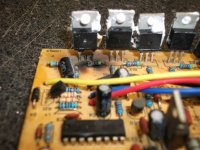Keep in mind, as you go higher in voltage, that sometimes a brushed motor (especially with long wires to the motor and battery from the controller), generates lots of RF voltage spikes, some of them really high. If any of those are high enough, they could pop MOSFETs. It might even be possible under the right conditions to generate a *negative* spike that is negative enough voltage to trash a FET in a different way.
Current spikes thru a motor generate voltage spikes, too. Bigger current spikes mean bigger voltage spikes. I don't expect that's as big a problem as the RF from the brush arcs, but it does get worse the higher in voltage and power you go.
I don't have a link to the data, but 4QD in the UK has (or had) a page with data and observations about brushed motor controller failures.
Current spikes thru a motor generate voltage spikes, too. Bigger current spikes mean bigger voltage spikes. I don't expect that's as big a problem as the RF from the brush arcs, but it does get worse the higher in voltage and power you go.
I don't have a link to the data, but 4QD in the UK has (or had) a page with data and observations about brushed motor controller failures.




